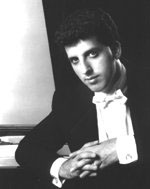 The career of pianist Jeffrey Biegel has been marked by bold, creative achievements and highlighted by a series of firsts. The career of pianist Jeffrey Biegel has been marked by bold, creative achievements and highlighted by a series of firsts.
He performed the first live internet recitals in New York and Amsterdam in 1997 and 1998, enabling him to be seen and heard by a global audience. In 1999, he assembled the largest consortium of orchestras (over 25), to celebrate the millennium with a new concerto composed for him by Ellen Taaffe Zwilich. The piece, entitled 'Millennium Fantasy for Piano and Orchestra', was premiered with the Cincinnati Symphony Orchestra. In 1997, he performed the World Premiere of the restored, original 1924 manuscript of George Gershwin's 'Rhapsody in Blue' with the Boston Pops. Charles Strouse composed a new work titled 'Concerto America' for Biegel, celebrating America and honoring the heroes and events of 9-11. Biegel premiered the piece with the Boston Pops in 2002. He transcribed the first edition of Balakirev's 'Islamey Fantasy' for piano and orchestra, which he premiered with the American Symphony Orchestra in 2001, and edited and recorded the first complete set of all '25 Preludes' by Cesar Cui.
Currently, he is assembling the first global consortium for the new 'Concerto no. 3 for Piano and Orchestra' being composed for him by Lowell Liebermann for 2005-06-07. The World Premiere will take place with the Milwaukee Symphony Orchestra, conducted by Andreas Delfs on May 12-14 2006, followed by the European Premiere with the Schleswig Holstein Symphony Orchestra, conducted by Gerard Oskamp, February 6-9, 2007.
Biegel is currently on the piano faculty at the Brooklyn Conservatory of Music at Brooklyn College, at the City University of New York (CUNY) and the Graduate Center of the City University of New York (CUNY).
|
|
|
|
|
|

Tuesday, November 28, 2006
Middle age gets to the fingers
What an unusual experience: returning to pieces I have not played for so long--in an attempt to try to repeat the way I played twenty years ago, I am somewhat relieved that I am not playing as I did twenty years ago. What does that mean? In my young search for the ultimate interpretations of standard repertoire, I remember so much of the process--tonal production, tempi, pedaling, phrasing, dynamics. In returning to these pieces, it almost seems too easy--everything falls into place without the same thought and stress of 'what to do'. I find I am playing fast pieces a bit slower, and slow pieces a bit faster. What's that all about? Perhaps it has something to do with age and experience--teaching, performing, arranging, who knows. I don't find the need to play as fast--although it probably still is fast as necessary--and I was never ridiculed or criticized for doing so, or for trying too hard to make a musical statement. I find more simplicity now--clearer thoughts, musical lines--not to say I am finding things more matter-of-fact, quite the contrary--I simply find it easier to do what's on the page and alittle more, without it sounding drippingly over-Romantic or underestimating the emotional state of the composer at the time of writing. I am finding a marriage of heart, mind and spirit which is not as 'mindful' and cerebral as it might have been, rather, more of a natural language than it has ever been. Then comes the question: am I doing enough? Well, I am still able to sing out loud as I play and float the melodies on a single breath without feeling the need to grasp for air (I have always sang along as I practiced, as did my teacher, Adele Marcus). I am not sure if my fingers can fly as fast as they did--though in encores after concerti, they do, but musically, I can't do that--it doesn't seem appropriate to play too fast when the music doesn't speak naturally--
There is a renewed sense of inner trust--to do what comes naturally--trusting the years of effort placed on thought and reason. I trust I will do exactly what is appropriate. I have grown to like that word 'appropriate'--it is not a definite interpretation when one says it is 'appropriate', because it is appropriate for the now--not right, and not wrong. What was appropriate twenty years ago is not now. I can play a slow movement to a Mozart Sonata and a Brahms Intermezzo appropriately now--not overdone, not underdone (yes, like a steak!) I am not as worried that it is too slow, or too fast--it is the singing line that predominates my sense of pulse now. I don't use a metronome--my sense of pulse is based on the natural vocal lines, and Andante for Mozart is not so slow, nor is Adagio for Brahms. The word isn't metronomically as important to me as it is a sense of the phrase and the rhythmic flow.
The acid test will come when I perform recitals in Norway in January. This new sense is not as apparent in the concerto playing, because we have to keep a beat with the conductor and have the orchestra playing along. In recital, however, is where we are alone and the interpretation has ebbs and tides. I am curious to hear the reactions--especially from people who have not heard me perform these works for nearly 20 years.
posted by Jeffrey Biegel
10:49 AM
|
| |



